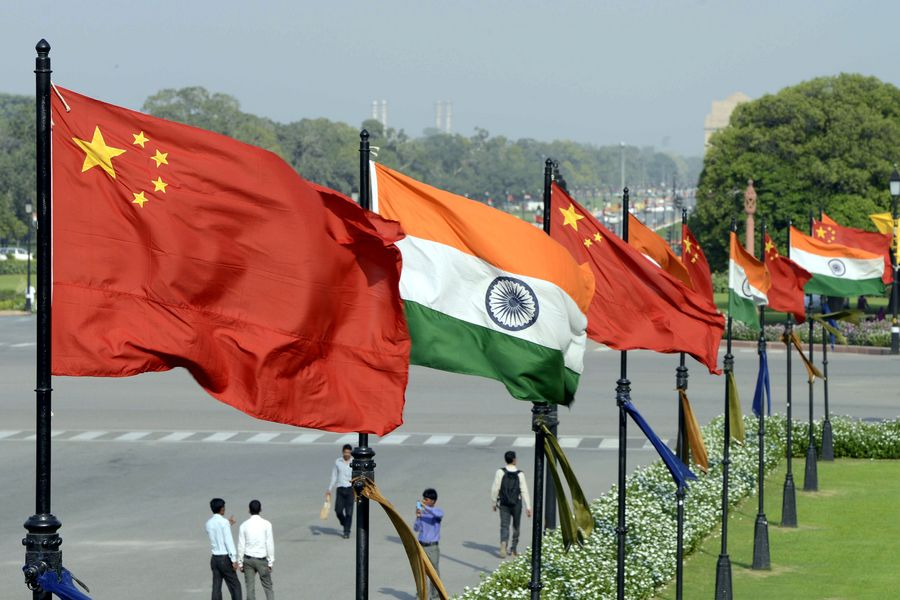Challenges before India's 2+2 dialogues with US and Japan
By Swaran Singh | CHINA DAILY | Updated: 2022-04-09 08:53

India's foreign and defense ministers will travel to Washington and Tokyo next week to revive their "2+2 dialogues" with the United States and Japan. In Washington, India's Foreign Minister Subrahmanyam Jaishankar and Defense Minister Rajnath Singh will hold talks with US Secretary of State Antony Blinken and Defense Secretary Lloyd Austin, and in Tokyo they will meet with Japanese Foreign Minister Yoshimasa Hayashi and Defense Minister Nobuo Kishi.
The 2+2 dialogues-comprising institutionalized regular interactions at the highest level of policy-making in their defense, security and intelligence partnerships-started with the US in September 2018 and Japan in November 2019. However, due to the COVID-19 pandemic, the last 2+2 dialogue with the US was held in October 2020 and Japan in April 2021.
India also initiated a 2+2 dialogue with Australia in September 2021 and Russia in December 2021. That leaves China as the only major power missing from India's 2+2 dialogue list.
That all the first 2+2 dialogues were held in New Delhi reflects India's deep faith in their efficacy. That also puts the onus on India to not only revive the extant dialogues but to explore the possibility of starting one with China as well, marking a new chapter in India-China relations.
To begin with, India's challenges in reviving its 2+2 dialogues with the US and Japan stem from the fact that those would be their first such interactions since US President Joe Biden and Japanese Prime Minister Fumio Kishida took office.
The fourth Indo-US 2+2 dialogue was scheduled for December but could not be held. Meanwhile, President Biden had already hosted the first offline Leaders' Summit of the Quadrilateral Framework in September. This is when India and the US held an "inter-sessional" official-level meeting to review the progress of their 2+2 dialogues.
Yet despite both Biden and Kishida holding regular online and offline meetings with the Indian prime minister, there was this inordinate delay in holding the Indo-US 2+2 dialogue.
The pandemic-induced long silence, therefore, will not be the only thing making the Indo-US dialogue trickier. India's neutrality in the Russia-Ukraine conflict has become an overbearing irritant in their hard-earned bonhomie.
India purchasing Russian oil and Chinese State Councilor and Foreign Minister Wang Yi and Russian Foreign Minister Sergei Lavrov visiting India in quick succession have increased the US' anxieties about New Delhi joining Moscow in circumventing the US-led Western sanctions. The result: US officials' criticisms of India have reached new levels, including warning India that it will have to bear the consequences of its stance. Japan, too, has been nudging India to toe the US' line.
India's interlocutors in Washington and Tokyo are therefore bound to use closed-door meetings to push for a course correction, and thus deflect the energies away from the bilateral agenda. What could make the issue murkier is that India is unlikely to call out Russia's aggression, let alone condemning it.
India is firm on its neutral stance, and urges all sides to respect international law, sovereignty and territorial integrity while calling on both Russia and Ukraine to cease hostilities and end the crisis through peaceful talks between Russian President Vladimir Putin and Ukrainian President Volodymyr Zelensky.
If anything, New Delhi has become a victim of Washington's inability to rein in its NATO allies that undergird its global leadership.
The reality is that in spite of all the hype of severe sanctions, four of the top five buyers of Russian oil are close US allies. For instance, Germany buys 40 percent of its gas from Russia. And the European Union, as a whole, has agreed to piecemeal reduction in Russian imports by the end of this year, hoping the conflict would be over much before the deadline.
Perhaps the US was emboldened to take India for granted because of New Delhi's recent track record of complying with Washington's dictates of stopping oil purchases from Iran and Venezuela. But in doing so, the US failed to understand India's ties with Russia are one of its kind and not negotiable.
The 2+2 dialogue in Tokyo, to be held within a year of the last one, may be comparatively easy to hold, because Kishida visited New Delhi last month and announced that Japan will invest 5 trillion yen ($40.40 billion) in India in the next five years, and the first India-Japan vice-minister-level 2+2 dialogue was held in New Delhi in June 2010, and the fifth in June 2018 when it was upgraded to the ministerial level.
Despite all these limitations, the 2+2 dialogues may go well beyond the optics, which, however, remain their integral part. This institutionalizing of interactions at the highest level of defense and foreign policy decision-making reflects the countries' shared commitment to promote policy synergy and deepen their defense, security and intelligence partnerships, which have become all the more critical amid the Ukraine crisis.
India's first foundational agreement with the US, the Communications Compatibility and Security Agreement, in discussion for a long period of time, was signed soon after their first 2+2 dialogue in September 2018. The second and third 2+2 dialogues, held in December 2019 and October 2020 respectively, saw them signing their Basic Exchange and Cooperation Agreement and building stronger synergy in the Quadrilateral Security Framework.
Likewise, the first India-Japan 2+2 dialogue in September 2019 resulted in the finalization of the "reciprocal provision of supplies and services" deal between the Japan Self-Defense Forces and the Indian Armed Forces, which was signed in September 2020.
Whether their institutional memory and piecemeal bridge building in recent years will prevent them from squandering this opportunity over egos remains unclear as of now.
The author is a professor of international relations at Jawaharlal Nehru University, New Delhi.
If you have a specific expertise, or would like to share your thought about our stories, then send us your writings at opinion@chinadaily.com.cn, and comment@chinadaily.com.cn.























